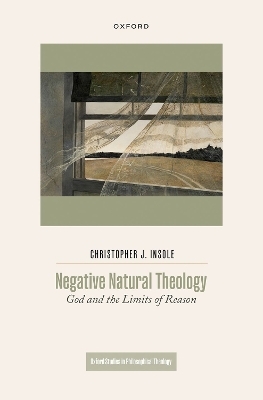
Negative Natural Theology
Oxford University Press (Verlag)
978-0-19-893297-0 (ISBN)
- Noch nicht erschienen (ca. Dezember 2024)
- Versandkostenfrei
- Auch auf Rechnung
- Artikel merken
How can we live in harmony with the universe, and not just in it? What is it to feel at home in the world?
Some thinkers who feel the force of these questions reach for the concept of God. Others do not. This book asks what might be at stake in the choice of whether or not to speak about God: not just in terms of abstract reasoning or arguments about God, but in relation to deeper undercurrents of motivation and yearning.
The book is interested in sites in contemporary thinking, where the concept of the divine beckons, or looms, but also, perhaps, repels, or hides. It asks 'what is at stake' in the decision (if it is that) to talk about God and the divine, or not to do so, with a wide and deep curiosity about what this might include: reasons and arguments, certainly, but also more biographical, intuitive, and affective dimensions, including imagination, and feelings about what is valuable. Also relevant are unconscious drives and factors. Concepts can convince, or fail to convince, but, also, they can attract and repel.
The book draws on both analytical and continental post-Kantian sources, treating individual thinkers such as Immanuel Kant, William James, Carl Jung, Karl Rahner, Albert Camus, Saul Kripke, Thomas Nagel, Derek Parfit, Karen Kilby, and Janet Soskice, as well as cultural movements such as modern paganism, new atheism, and humanism.
'Natural theology' involves speaking about God without reference to revelation, tradition, or sources of authority, using the resources of 'reason alone'. 'Negative theology' is concerned with the way in which a type of abstract reasoning and rational argument run out, without this necessarily being an ending: other types of speech and communication may become possible and essential. Speaking into this space, the book draws on philosophy, theology, anthropology, literature, and psychology.
After teaching at the Universities of London and Cambridge, Christopher Insole took up his post at Durham in 2006, where he is Professor of Philosophical Theology and Ethics. He has published on realism and anti-realism, religious epistemology, the relationship between theology, metaphysics, and political philosophy, and on the thought of Immanuel Kant. His books include his two major studies of Kant's relationship to theology (Oxford, 2020 and 2013). His recent research has moved into a more contemporary and constructive key, engaging with the category of natural theology, as it meets the limits of reason and knowledge.
Chapter 1: The Cosmic Question: Thomas Nagel and Perspectives on Life
Chapter 2: The Existence of the Word God: Reference and Mystery
Chapter 3: Absurd and Holy Mystery: Karl Rahner and Albert Camus
Chapter 4: Humanism Not Mysterious: Anthropology and Belief
Chapter 5: William James' Radical Empiricism and Modern Paganism
Chapter 6: Absolute Idealism and Derek Parfit on What Really Matters
Chapter 7: Becoming Divine: Kant and Jung
Epilogue: The Varieties of Philosophical Experience
| Erscheint lt. Verlag | 24.12.2024 |
|---|---|
| Reihe/Serie | Oxford Studies Philosophical Theology |
| Verlagsort | Oxford |
| Sprache | englisch |
| Maße | 156 x 234 mm |
| Themenwelt | Religion / Theologie ► Christentum ► Kirchengeschichte |
| ISBN-10 | 0-19-893297-9 / 0198932979 |
| ISBN-13 | 978-0-19-893297-0 / 9780198932970 |
| Zustand | Neuware |
| Haben Sie eine Frage zum Produkt? |
aus dem Bereich


